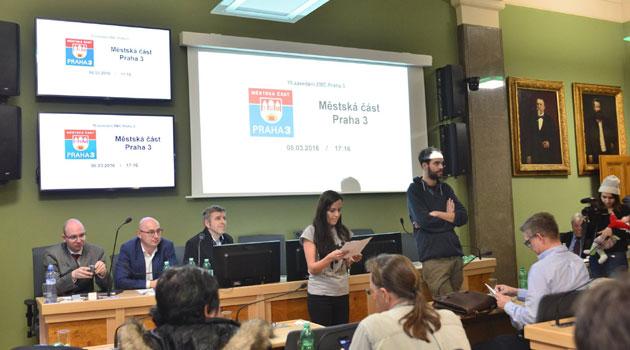Czech activists and local opposition council members want proof of building's use permit, officials stall

The governing coalition leading the Prague 3 Municipal Department did not approve the agenda item for today’s council meeting, which was convened by opposition members of the council to address the issue of the Autonomous Social Center Klinika in the Žižkov quarter. In a tense atmosphere, the councilors spent more than two hours discussing whether to approve the agenda item and would not allowed the activists present to address the council during regular session.
Since their contract ended six days ago, the activists have been occupying the building illegally. Others in attendance who were not allowed to address the council were the director of the Office for Government Representation in Property Affairs (Úřad pro zastupování státu ve věcech majetkových – ÚZSVM), Kateřina Arajmu, and Deputy Interior Minister Jiří Nováček, each of whom represented their superiors, the Czech Finance Minister and Interior Minister, respectively.
Tereza Virtová, the individual who borrowed the building from the ÚZSVM so Klinika could use it, was only able to take the floor after Mayor Vladislava Hujová (TOP 09) had officially closed the meeting. "We came here mainly to refute the deceptive allegations being made about us recently," she told those councilors who were willing to listen to her.
The activists are primarily bothered by allegations that they are "extremists". The ÚZSVM and the municipal department argue that the Czech Interior Ministry mentioned Klinika in its situational report on the topic of extremism last year.
Right-wing extremists attacked the building this February with rocks and pyrotechnics on the same day that anti-refugee demonstrations were held in Prague. Prior to that, Klinika had organized a collection of donated items in support of refugees.
"Despite a big turnout by both male and female citizens and by bureaucrats from the ÚZSVM, the council refused to approve the agenda item. This attempt by the coalition government of the local council is unambiguously to silence what is an unpleasant discussion for them. We keep being admonished to advocate for our interests through the established procedures of representative democracy, but when we try our best to do that, no one will give us the floor, and all that happens is a police vehicle follows us around and films us. This entire council was a tragicomic demonstration of the arrogance of power and the non-democratic procedures undertaken by these politicians," the activists said.
The two-hour discussion about the agenda item (during which opposition members of the local council and members of the council’s governing coalition alleged that the other side had violated the rules of order) revolved primarily around whether a valid decision as to the building’s use has ever in fact been taken. Accoring to the Building Works Authority for Prague 3, a decision has been found authorizing its use as a health care facility, which means those who borrowed the building used it for an unauthorized purpose, but opposition members on the local council are asking to see a copy of the building’s use permit.
According to the activists from Klinika and Green Party chair Matěj Stropnický, it is highly likely that no decision on a use permit for the building at Jeseniova 60 exists now or has ever existed. The building is said to have been in use for more than 60 years without one.
"We are asking the Building Works Authority to quickly prove their claims, and if they cannot do so, that will be unequivocal confirmation that the arguments made for not extending our contract have been deceptive and that the authorities and politicians are doing their best to get rid of Klinika for political reasons," the activists said. According to the Prague 3 mayor, however, the local council cannot negotiate about a building it does not own, as it is a state asset.
The local coalition government includes members of the Civic Democratic Party (ODS), the Czech Social Democratic Party (ČSSD) and TOP 09, all of whom refused to support the agenda item about the building. According to local councilor Ivana Holečka (ČSSD), for the local council to officially deal with Klinika at all would legitimize their breaking of the law.
"Today has convinced us that our decision to engage in civil disobedience was legitimate," the Klinika activists said. As previously reported, according to the director of the ÚZSVM, the necessity of keeping the building in the hands of the state must now be reviewed by the Government’s dislocation commission.
If no other organizational unit of the state expresses interest in the building, the plan is to sell it (municipalities are not state units). The ÚZSVM filed a complaint at the end of last week asking police to investigate whether the use of the building by the Klinika center after the contract has expired is illegal.
The squatters initially occupied the building at the end of 2014 and after several months, with the assent of the Czech Government, succeeded in borrowing it for one year. In the past, hundreds of people have demonstrated in support of the center remaining at the facility.
A community laundry room, library, and cafe have been running there, and concerts and lectures have been given there. Klinika’s programs are offered free of charge or for a voluntary donation.
Activists have also repaired the building, primarily with their own labor. They have refused subsidies from the local government and from big sponsors.